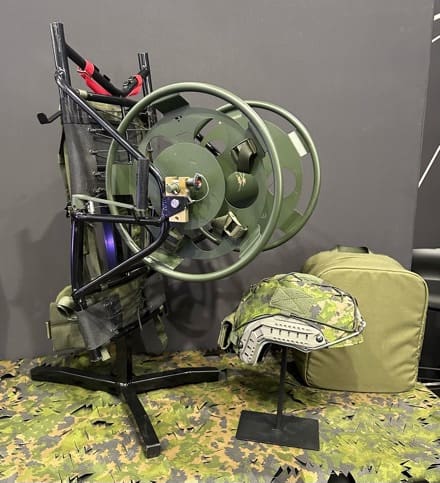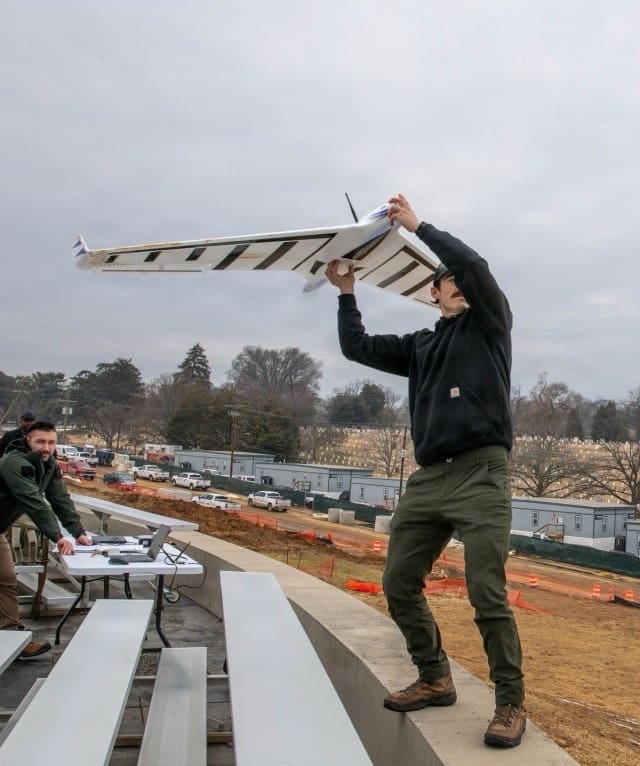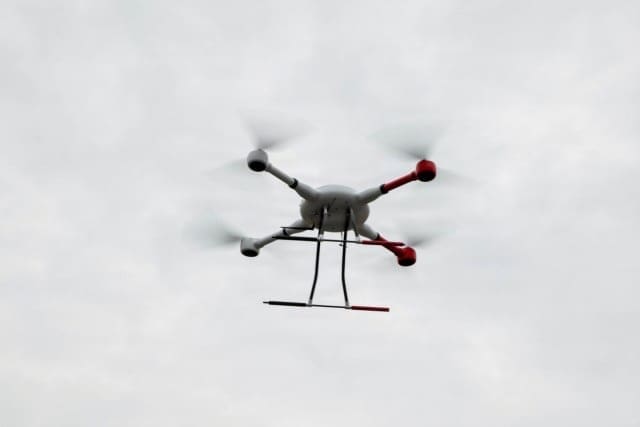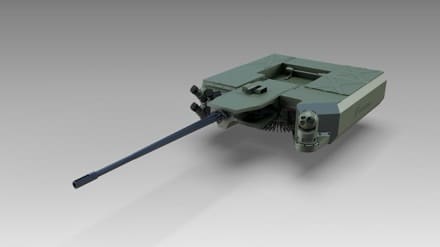Finnish load carriage specialists Savotta displayed their pack frame configured to lay field wire for telephones.

Finnish load carriage specialists Savotta displayed their pack frame configured to lay field wire for telephones.


JOINT BASE MYER-HENDERSON HALL, Va. — Joint Inter-Agency Task Force – 401 participated in a multi-day Counter-Small Unmanned Aircraft Systems Threat Simulation Exercise this week, designed to test and evaluate cutting-edge technologies aimed at protecting the National Capital Region. The exercise was a collaborative effort involving the base defense forces of Joint Base Myer-Henderson Hall and key leaders from the Joint Task Force – National Capital Region, Combat Capabilities Development Command and the U.S. Army Military District of Washington. The Director of JIATF-401, Brig. Gen. Matt Ross, visited the exercise on February 18 and praised the team’s efforts to test and train our forces on cutting edge counter drone technology.

“The threats we face are constantly evolving, and exercises like this are critical to ensuring we stay ahead of our adversaries,” stated Ross. “Seeing these dedicated teams and advanced technologies in action gives me great confidence in our ability to defend the vital assets within the National Capital Region. This is innovation and collaboration at its finest.”
The exercise involved the execution of dozens of simulated sUAS incidents, utilizing various drone types to test eleven different sensor systems and three mitigation devices. These scenarios, run during both day and night, were designed to replicate real-world threats and enhance the readiness of regional security forces.

A key focus of the event was the interoperability between different agencies and the seamless integration of their technologies. The data collected will be instrumental in refining the multi-layered defense strategy for the NCR.
Col. Brian Reynolds, provost marshal of Joint Task Force – National Capital Region, emphasized the importance of the joint effort. “This training is about more than just technology; it’s about people and partnerships,” said Reynolds. “By bringing together interagency, federal, state and local law enforcement, we are building a unified and coordinated defense. The interoperability we are honing this week ensures that we can act as a cohesive team to detect, track and mitigate any potential aerial threat. Every agency brings a unique capability to the fight, and together, we create a formidable domestic shield for installations in the homeland.”

JIATF-401 and its partners remain committed to continuous innovation, joint force training, and the rapid delivery of state-of-the-art c-UAS capability our warfighters need to defend the homeland.
By LTC Adam Scher
NEW YORK, Feb. 23, 2026 — Accrete, Inc., a dual-use AI company founded in 2017, whose Knowledge Engine platform encodes institutional knowledge, judgment, and expertise into AI agents for decision superiority, announced that it has successfully deployed its Argus platform into the Joint Worldwide Intelligence Communications System (JWICS) through Second Front’s 2F Game Warden®.

This is an important step in Accrete’s ongoing effort to meet surging demand by delivering expanded capabilities for teams operating in Top Secret data environments. This achievement reinforces Accrete’s dedication to current and future defense stakeholders while bringing more value to organizations, reducing friction between workflows, and accelerating the delivery of insights that inform time-sensitive decisions.
“Customer need for Accrete’s platform is growing because mission teams need trusted, actionable answers from complex data,” said Prashant Bhuyan, Founder, CEO, and Chairman of Accrete, Inc. “JWICS deployment means that Accrete’s Expert AI Agents can interact with open source and government data to drive faster, better-informed outcomes, delivering decision advantage in mission-critical environments.”
Accrete’s Knowledge Engine is the foundational cognitive infrastructure for encoding institutional knowledge into persistent organizational intelligence. Knowledge Engines become even more powerful when they can operate across classified and unclassified data, connecting siloed systems into shared context while preserving the why behind past decisions. Accrete’s platform enables trusted AI agents to surface critical insights and emerging risks that humans would never think to search for as information complexity grows.
“This milestone reflects Accrete’s broader focus on scaling alongside customer needs. The company has been operational at DoW Impact Level 4 (IL4) and is now expanding secure support for classified data, accelerating capability delivery, and ensuring defense customers can apply Accrete’s AI platform across the full range of mission operations,” said Bill Wall, CEO of Accrete AI Government.

SAN DIEGO – 23 February 2026 – General Atomics Aeronautical Systems, Inc. (GA-ASI) is developing the addition of long-range standoff weapons to its top-of-the-line MQ-9B SkyGuardian® and SeaGuardian®.
Demand continues from naval and air warfighters for platforms that can hold targets at risk from great ranges, especially over the expanses of air and water in the Western Pacific. That’s why GA-ASI engineers have begun the work of adapting MQ-9B’s payload, stability, range and other features to accommodate the new generation of extended-range precision weapons.
“MQ-9B continues to impress in the field and we keep adding to our global customer list,” said GA-ASI President David R. Alexander. “We want to continue to build value in the aircraft by expanding into more missions. MQ-9B features extraordinary payload capacity, so it only makes sense to add to our mission sets with the ability to carry long-range weapons.”
So far, GA-ASI has performed all the performance analytics and is confident in MQ-9B’s ability to carry long-range weapons over long distances, while providing a measure of persistence and endurance. Company engineers and others continue to refine the technical aspects of this integration and potential concepts of operation, eyeing weapons such as the Lockheed Martin Joint Air-to-Surface Standoff Missile and Long-Range Anti-Ship Missile, as well as the Kongsberg/Raytheon Joint Strike Missile.
GA-ASI plans to fly at least one of these new weapons as early as 2026.
Hypothetically, a mission profile might look like this: MQ-9Bs could launch from a number of friendly bases in the Western or Southern Pacific, fly to a hold point and loiter there outside a hostile power’s weapons engagement zone. If the order came to release the weapons, the aircraft could launch them in coordination with other U.S. or allied operations.
In addition to the SkyGuardian and SeaGuardian models, MQ-9B also includes the Protector RG Mk1 that is currently being delivered to the United Kingdom’s Royal Air Force (RAF). GA-ASI also has MQ-9B procurement contracts with Belgium, Canada, Denmark, Germany, India, Japan, Poland, Taiwan and the U.S. Air Force in support of the Special Operations Command. MQ-9B has also been featured in various U.S. Navy exercises, including Northern Edge, Integrated Battle Problem, RIMPAC, and Group Sail.
Rheinmetall will contribute to the reconnaissance capabilities, combat effectiveness and training of the German Army’s Intelligence and Reconnaissance Corps. General Dynamics European Land Systems (GDELS) is the prime contractor for the next generation ‘Luchs 2’ reconnaissance vehicle of the Bundeswehr, which is due to be delivered from 2029 onwards. GDELS has commissioned Rheinmetall to supply the turret, main armament and corresponding simulators. The contract was signed in Kaiserslautern at the beginning of February 2026. The total order value is in the mid three-digit million-euro range.

“We are grateful for the trust that GDELS and the Bundeswehr have placed in our products and capabilities”, said Timo Haas, Head of the Digital Systems Division. “The Luchs 2 contract package is a significant success for our Bremen site and our colleagues in Rome. At the same time, it sends a strong signal in favour of European defence cooperation”.
The largest share of the Luchs 2 contract package will be fulfilled by Rheinmetall Electronics GmbH in Bremen. At first, 274 CT-025 turrets are to be delivered by 2031, marking the first major order of this newly developed, modular, unmanned turret system. The Luchs 2 will receive a modified version of the CT-025, complying with the specific requirements of the Bundeswehr. The newly developed Rheinmetall turret will serve as a technological base platform for different mission profiles, and combines high operational capabilities with maximum adaptability to operational and logistical requirements.
State-of-the-art sensor technology and digital networking give the turret particular strengths: a stabilised vision system enables precise counter-attacks against ground and air targets, including drones (UAVs). The fully digitalised fire control system with inertial weapon stabilisation, a ballistic computer and GVA/NGVA-compatible interfaces, ensures maximum accuracy, even when the vehicle is in movement.
Furthermore, the Bundeswehr version of the CT-025 features a turret hatch supplemented by ballistic protection, allowing an open protected position while commanding the vehicle in motion. To comply with the maximum weight requirement, the ammunition supply has been adapted according with the mission. Additionally, the height profile has been optimised to ensure compatibility with other platforms.
The CT-025’s open, modular framework enables full integration into the Rheinmetall Battlesuite, the Group’s digital ‘capability store’. This allows functions such as AI-supported target tracking or mission-specific software upgrades to be quickly and flexibly integrated without hardware modifications.
The German Army’s mechanized reconnaissance forces will soon be fighting with the tried-and-tested Oerlikon KBA 25 mm automatic cannon. Manufactured by Rheinmetall Italia S.p.A. in Rome, it is Rheinmetall’s most widely produced weapon in the NATO standard calibre of 25 mm x 137. Manufactured over 6,000 times, it combines a battle-proven design with outstanding reliability. With three firing modes (single shot, rapid single fire /175 rounds per minute and burst fire /600 rounds per minute), dual belt feed and a range of up to 2,500 metres, the CT-025 offers versatile firepower. The Oerlikon KBA 25 mm is a cost-effective, scalable solution offering high effectiveness against a wide range of targets due to the variety of 25 mm x 137 ammunition types available. It can penetrate the armour of most modern armoured personnel carriers.
With a firing rate of 600 rounds per minute – the highest in its category – and thanks to the new 25 mm x 137 proximity fuse ammunition technology, it also provides an effective protection against drones. The dual belt feeder allows two different types of ammunition to be loaded as well as a fast interchange between the two. This turns the KBA 25 mm into a thorough, multi-purpose weapon. Its low recoil enables it to be installed on various platforms, ranging from heavy tracked vehicles to light armoured 4×4 reconnaissance vehicles. It is suitable for both manned and unmanned turrets, as well as anti-aircraft mounts and naval applications. This paves the way for a cross-sectional main weapon for the Bundeswehr, enabling synergies in training, maintenance and logistics.
Modern simulation technology, also supplied by Rheinmetall Electronics, will soon be used to provide comprehensive, mission-oriented, modern training for reconnaissance soldiers. GDELS has commissioned the development and delivery of six combat simulation training devices for vehicle-based reconnaissance troops (AGFS). The reference system is scheduled for delivery in mid-2028 and will later be upgraded to the same standard as the other five devices in the series.
The AGFS is a highly realistic simulator, recreating the battlefield. Its precise replication of key elements, such as vehicle logic, sensor technology and ballistics, enables highly realistic training in line with the ‘train as you fight’ concept. The AGFS is designed to enable networking with other AGFS simulators or other compatible systems. Rheinmetall is developing the AGFS on the same technological basis as the firing and combat simulators already under contract for the Puma infantry fighting vehicle, the heavy weapon carrier and the Schakal wheeled infantry fighting vehicle.
Rheinmetall has also been commissioned in the field of live simulation. The established training device, the AGDUS combat simulator, will be fully integrated into the coming vehicle fleet. The laser-based training tool will enable army reconnaissance troops to train in realistic conditions – from firing exercises to large-scale exercises in the combat training centre in all types of operations. Rheinmetall is thus relying on the installation already proven in the Puma and Lynx programmes, which enables laser-based combat using original display and control elements.
TAMPA, FL – (Feb. 24, 2026) – Global Military Products, a Global Ordnance Company, received a contract to deliver its Scorpion Light mobile mortar system through the Naval Surface Technology & Innovation Consortium for the U.S. Marine Corps. Mounted on the Polaris MRZR Alpha 6×6, the fully integrated platform enhances the mobility, lethality, operator safety and air transportability of these assets.
“This contract signals a step forward in the Marine Corps’ mortar modernization,” said James Knight, director, Global Military Products. “This partnership delivers a revolutionary ‘shoot and scoot’ capability designed for expeditionary forces operating in high-threat, dispersed environments by providing critical indirect fire support to light infantry formations.”

The Scorpion Light mobile mortar system can be deployed, fire 8 rounds and relocate in less than 2 minutes, which was recently demonstrated on a range at Quantico in conjunction with the Marine Gunners Symposium. Rapid emplacement and displacement are critical for survivability on a modern battlefield, allowing mortar teams to engage targets and reposition before an adversary can return effective counter-battery fire.
The Scorpion Light mobile mortar system will also incorporate an advanced digital fire control system that enables rapid, accurate targeting and re-aiming with minimal crew intervention. Marines can use the rapid-fire control system to engage multiple targets quickly and efficiently during combat operations, elevating operational efficiency, while the expanded payload of the MRZR Alpha 6×6 variant allows for 48 mortars to also be transported.
The pre-production MRZR Alpha 6×6 is manufactured by Polaris. This TRL-8 prototype vehicle is a two-seat platform with a 65 percent larger cargo bed optimized for heavier systems and payloads, like the Scorpion Light. The vehicle has 3,600 lbs (about 1632.93 kg) of payload available, with 3,000 lbs (about 1360.78 kg) of that available in the extended cargo bed. The third axle and short wheelbase also have a positive impact on mobility, enhancing performance in soft soil, mud and bogs. The MRZR Alpha 6×6 maintains top speed and has more than 90 percent parts commonality with the base MRZR Alpha that are currently being fielded with the U.S. Marine Corps and U.S. Special Forces.
With its ability to be internally transported by a V-22 Osprey helicopter, the integrated Scorpion Light and MRZR Alpha 6×6 platform provide rapid deployment in remote and austere environments.
The firm-fixed price contract has a ceiling of $4.9M. Once delivered, the systems will undergo Marine Corps live-fire testing and evaluation.
Every year during Enforce Tac, the TACWRK team comes up with a cool morale patch. This year they are leaning into the #dingetun theme with the Rambo III-inspired Blaues-Licht (Blue Light).

During the movie, our hero uses blue chemlights which leads to this famous dialogue exchange.
Hamid: “What’s this for?”
Rambo: “It’s blue light.”
Hamid: “And what does it do?”
Rambo: “It shines blue.”